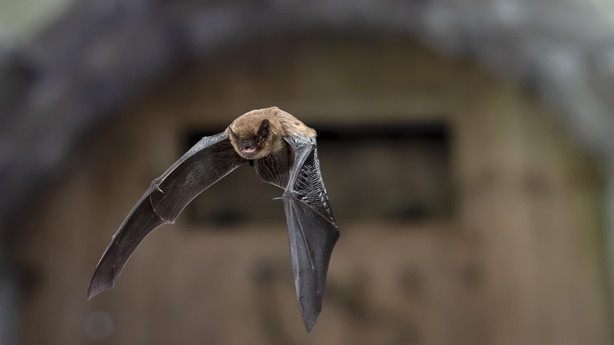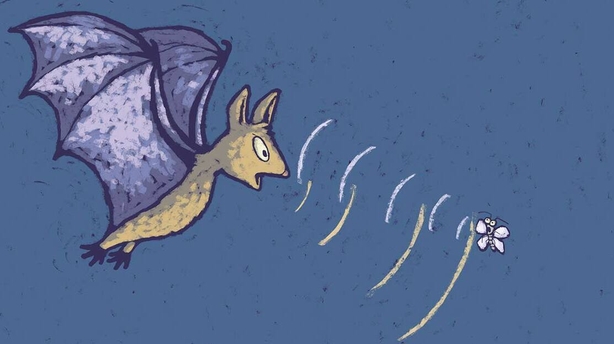This time of year is one of change. A time of transition; as the sun goes down earlier and earlier, the nights grow darker, and the leaves fall from the trees. And it also see the arrival of Samhain. It's also the time where we see images of one cute little creature that gets a bad rap - the bat.
In this episode of Ecolution, Donna Mullen of Wildlife Surveys Ireland, proves that they're not at all as scary as you might think. And Brian Keeley of Bat Conservation Ireland talks about how we can help them.
Bats are the one REAL creature of the night forever linked to the spooky season. It doesn't help that Bram Stoker invented Dracula, tying the winged rodent forever to the terrors of the vampire. But today, we dispel the myths. Because bats are some of the good guys!!
Press play up top and subscribe here, or wherever you get your podcasts!

It's kind of funny that we put bats beside Halloween as this is actually the time of year when Bats go into hibernation. Typically, around October and November bats will settle into their winter slumber, not emerging again until around March.
Mysteriously, according to Bat Conservation Ireland, there is very little known about where bats hibernate in winter. The summer roosts they find in attics and Houses are usually too warm. Ideally in hibernation, bats need temperatures of a cool 7 degrees. In Britain they’ve built costly underground structures to do the job. But this hasn’t happened here yet. So they might choose caves, bridges, crevices in stone-outbuildings, or even tree holes. Or a friendly, neighbourhood Bat Box.
Bat Conservation Ireland have more on the life cycle of the winged creatures on their website too.
Brian Keeley works with Bat Conservation Ireland talks about how we can help them in this episode.
Just over a month ago, in early September, we joined a very excitable crowd of all ages at Broombridge Luas Station. They had gathered to go on a very special bat walk along the Royal Canal, led by bat expert and farmer, Donna Mullen.
Donna and others had brought along Bat Detectors. Small hand-held instruments that pick up ultrasound. These are sounds at frequencies too high for the human ear to hear. But the detectors convert it into a sound we can hear. And so everyone had their ears peeled.
We've spoken before about the importance of making space for nature on farms. And it’s something Donna and her family are passionate about, putting up over 50 bat boxes on their land to date. Donna designed false rafters backed with felt which cost less than €20 each and, crucially achieves just the right temperature bats need in the winter.
There are also lots of old wives tales about bats. One is that they drink human blood, which they really do not! In fact, many bats hoover up mosquitoes, actually helping deal with the real bloodsuckers of the world.
Did you know that bats really want to eat tasty bugs. They can eat up to 3,000 in one night!!

Another is that bats are blind. They actually have small eyes that help them see at night. Megabats, such as the fruit bats of Australia, use sight and smell to hunt. But microbats, like those we have in Ireland, use echo-location. Sending out high pitched sound waves that bounce off surfaces, helping them understand their surroundings. And find their food.
Some people even think bats can get stuck in your hair. In reality, bats are not interested in your hair at all. They may fly close to you in search of insects but their amazing use of that echolocation will prevent them from landing on you.
But did we find any bats on our walk? You'll have to listen to the latest episode to find out!
This event was organized by Connecting Cabra as part of the Cabra Biodiversity Action Plan. It was done in collaboration with DCC Biodiversity Officer Lorraine Bull. Huge thanks to the organisers and particularly Donna, who’s work on bats and other creatures for Wildlife Surveys Ireland is so important. To find out more about how you can help bats, just search online. Bat Conservation Ireland have some excellent tips and do important work. They could also use our help!
Visit www.batconservationireland.org to find out more!
If you or your class would like to be part of Ecolution, we'd love to hear from you.
Email junior@rte.ie
We'd really appreciate it if you could like, follow and review Ecolution wherever you stream it. It really helps get the word out.
Subscribe here, or wherever you get your podcasts!
And, did you know that we have lots more RTÉjr Podcasts for young people of all ages?
